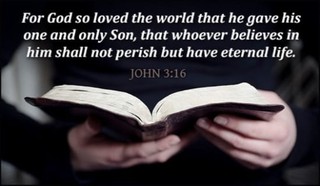- Recent Translations
- All Translations
John 3:1
Share
Settings
Jesus Teaches Nicodemus
1 Now there was a Pharisee, a man named Nicodemus who was a member of the Jewish ruling council.John 3:1 in Other Translations
John 3:1 Meaning and Commentary
There was a man of the Pharisees
The Syriac version adds, "there"; that is, at Jerusalem; and who was among those that believed in the name of Christ, upon seeing the miracles he did at the feast of the passover, in that place. This man was not a common and ordinary man, but a man of note and eminence, of dignity and figure; and who was of the sect of the Pharisees, which was the strictest sect for religion and holiness, among the Jews; and which, as corrupt as it was, was also the soundest; as having not only a regard to a Messiah, and to all the writings of the Old Testament, but also believed the doctrines of angels and spirits, and the resurrection of the dead, which the Sadducees denied; but yet they were implacable enemies of Christ; and therefore it is the more to be wondered at, that such an one should come to him, and desire a conversation with him:
named Nicodemus;
frequent mention is made of (Nwyrwg Nb Nwmydqn) , "Nicodemon ben Gorion", the brother of Josephus ben Gorion F16, the writer of the Wars and Antiquities of the Jews; and there are some things which make it probable, that he was the same with this Nicodemus; for the Nicodemon the Jews speak so much of, lived in this age; as appears, not only from his being the brother of Josephus, but also from his being contemporary with R. Jochanan ben Zaccai, who lived in this time, and until the destruction of the temple; since these two are said F17 to be together at a feast, made for the circumcision of a child. Moreover, he is represented as very rich, and is said to be one of the three rich men in Jerusalem F18, and who was able to have maintained (hnydm) , a city ten years F19; and they speak of his daughter, as exceeding rich: they say, that she had for her dowry a thousand thousand golden denarii, or pence; and that her bed was strewed with (i.e. the furniture of it cost) twelve thousand golden denarii; and that a Tyrian golden denarius was spent upon her every week, for a certain kind of soup F20; and the wise men decreed her four hundred golden denarii, for a box of spices every day F21; and it is elsewhere F23 said, five hundred: and this our Nicodemus was very rich, as appears from his liberality at the funeral of our Lord, ( John 19:39 ) . Moreover, the Nicodemon of the Jews, is said to be a counsellor F24 in Jerusalem; and so was this, as seems evident from ( John 7:32 John 7:50 John 7:51 ) and it may be further observed F25, that the right name of Nicodemon, was Boni F26; now Boni elsewhere F1, is said to be one of the disciples of Jesus, as Nicodemus was secretly, and perhaps at, and after his death openly, as his associate Joseph of Arimathea was; to which may be added, the extreme poverty that his daughter is by them said to be reduced unto; for they report, that R. Jochanan ben Zaccai saw her gathering barley corns from under the horses' hoofs in Aco F2; or as it is elsewhere said, out of the dung of the beasts of the Arabians; when she asked alms of him, and he inquired of her, what was become of her father's substance. Now to this low estate, the family of our Nicodemus might be reduced, through the persecution of the Christians by the Jews. The name is Greek, as at this time many Greek names were in use among the Jews, and signifies the same as Nicolas; but the Jews give an etymology of it, agreeably to the Hebrew language; and say, that he was so called, because the sun, (hdqn) , "shone out for his sake": the occasion and reason of it, they tell us, were this F3; Nicodemon, upon want of water at one of the feasts, agreed with a certain man for twelve wells of water, to be returned on such a day, or pay twelve talents of silver; the day being come, the man demanded the water, or the money; Nicodemon went and prayed, and a plentiful rain fell, and filled the wells with water; but meeting the man, he insisted on it that the day was past, the sun being set, and therefore required the money; Nicodemon went and prayed again, and the sun shone out; and they add, that there are three persons for whom the sun (hmdqn) , "was prevented", detained, or hindered in its course, (a word nearer his name than the former,) Moses, and Joshua, and Nicodemon ben Gorion; for the two former they produce Scripture, and for the latter tradition: hence it is elsewhere said F4, that as the sun stood still for Joshua, so it stood still for Moses, and for Nicodemon ben Gorion: but to proceed with the account of our Nicodemus, he was
a ruler of the Jews;
not a civil magistrate; for the civil government was now in the hands of the Romans; but an ecclesiastical ruler; he was a member of the sanhedrim, which consisted of the doctors, or wise men, and priests, Levites, and elders of the people; and so was a dignified person, and as afterwards called, a master in Israel.
F16 Ganz Tzemach David, par. 1. fol. 25. 1. Shalshalet Hakabala, fol. 19. 1.
F17 Pirke Eliezer, c. 2. & Juchasin, fol. 23. 2.
F18 T. Bab. Gittin, fol. 56. 1.
F19 Midrash Kohelet, fol. 75. 4.
F20 Abot R. Nathan, c. 6. fol. 3. 2.
F21 T. Bab. Cetubot, fol. 66. 2.
F23 Echa Rabbati, fol. 49. 2.
F24 Echa Rabbati, fol. 46. 3. Midrash Kohelet, fol. 75. 1.
F25 T. Bab. Taanith, fol. 20. 1.
F26 T. Bab. Sanhedrin, fol. 43. 1.
F1 Echa Rabbati, fol. 49. 3.
F2 T. Bab. Cetubot, fol. 66. 2.
F3 T. Bab. Taanith, fol. 20. 1.
F4 T. Bab. Avoda Zara, fol. 25. 1.


